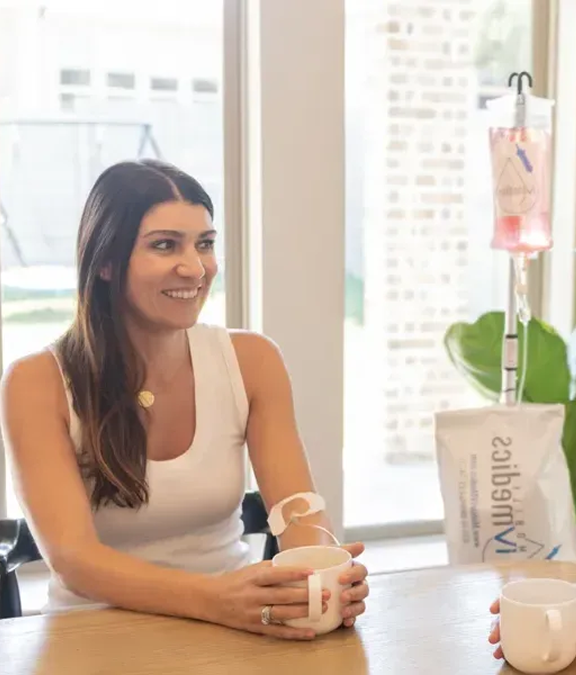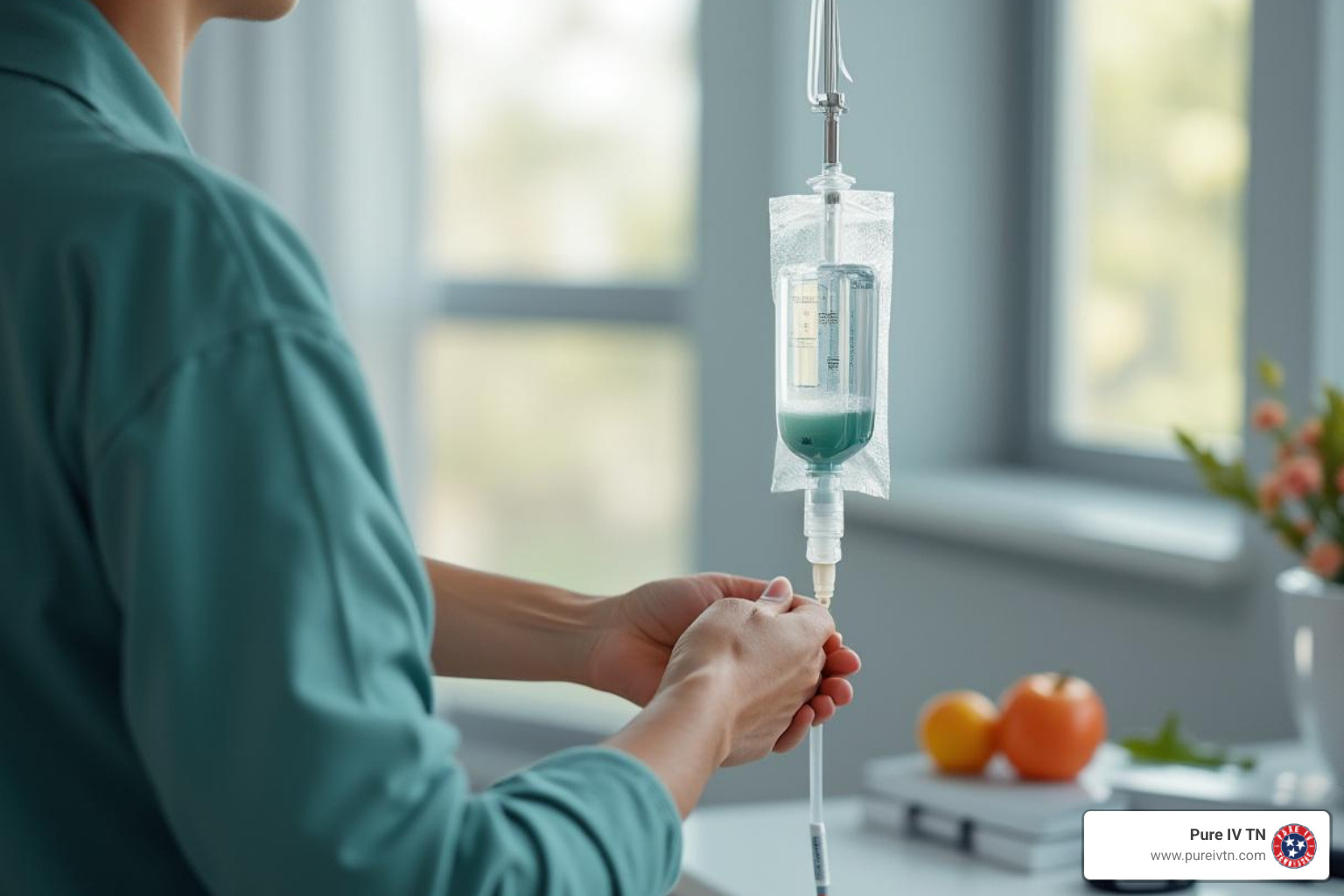How Long Do IV Vitamins Stay in Your System?
IV vitamin therapy is growing as a trusted wellness treatment. IV vitamins are nutrients delivered through a small IV line into your vein. They skip the digestive system and reach your blood directly.
Common treatments include Vitamin C infusions, the Myers’ cocktail, and hydration blends with electrolytes and minerals. Many patients use them for hydration, recovery, or wellness support.
But how long do IV vitamins stay in your system?
The answer depends on the type of vitamin, your body, and your health goals. This guide explains how IV vitamins work, how long they last, and what affects their duration.
How IV Vitamins Work in the Body
Oral vitamins must pass through the digestive system before entering the blood. Much is lost in this process. On the other hand, IV vitamins go straight into the bloodstream. This creates higher absorption and faster results compared to pills or supplements.
Once in circulation, nutrients spread through the body’s cells, tissues, and organs, supporting recovery and energy.
How Long Do IV Vitamins Stay in Your System?
The duration depends largely on the vitamin type.
Vitamin C is one of the most common IV nutrients. It usually stays in the body for a few days. Once the required vitamin C levels are met, any extra vitamin C is filtered out by the kidneys. High-dose IV vitamin C, however, can support immune function and tissue repair for up to two weeks.
B-complex vitamins (like B1, B2, B3, B5, B6, and B12) also circulate for several days. Because they are water-soluble, the body uses what it needs and releases the rest through urine. Even so, patients often feel the benefits, like increased energy or improved focus, for about one to two weeks.
The Myers’ cocktail, which combines Vitamin C, B vitamins, and magnesium sulfate, offers lasting effects. Patients experience improved energy, reduced migraine symptoms, or better recovery for up to two weeks after an infusion.
How Long Do IV Vitamin Benefits Last
The benefits of IV vitamin therapy can last longer than the vitamins themselves. This is because the body uses nutrients to repair, restore, and balance its systems, creating effects that extend beyond the actual presence of the vitamins in your bloodstream.
Patients notice improved energy, hydration, or immune support for days after treatment. Recovery-focused infusions may reduce fatigue or soreness for one to two weeks.
In most cases, IV vitamin therapy provides benefits that remain noticeable for several days to two weeks. Ongoing treatment, guided by a healthcare provider, helps maintain these results safely and consistently.
Factors That Affect How Long IV Vitamins Last
The time IV vitamins stay active in the system varies from person to person. Several factors determine how long your body holds onto the nutrients and how long you feel the effects.
Metabolism
Metabolism refers to the chemical processes that convert food and nutrients into energy. It determines how quickly your body breaks down and uses vitamins.
People with a fast metabolism process IV fluids at a quicker rate. This means their bodies may use up nutrients faster, leading to shorter-lasting effects after an IV infusion. Athletes, younger adults, and people with higher muscle mass usually have faster metabolisms.
By contrast, people with a slower metabolism hold IV fluids longer. Older adults or individuals with lower activity levels may feel the effects of IV vitamins for a longer period because their bodies use nutrients more slowly.
Health conditions also play a role. For example, thyroid disorders can either speed up or slow down metabolic processes, directly influencing how long IV vitamins remain active.
Hydration Levels
Hydration is critical for nutrient distribution. Water is the main medium that carries vitamins through the circulatory system. Without enough fluids, vitamins cannot travel effectively to tissues and organs.
When you are well-hydrated, your blood volume is stable, and vitamins circulate more efficiently. This helps nutrients reach target cells and stay active longer. Proper hydration also supports kidney function, allowing your body to balance what it uses and what it excretes.
Dehydration, on the other hand, limits circulation and can shorten the impact of IV therapy. A dehydrated body may process vitamins unevenly, meaning some areas get less support than others.
This is why many infusion therapies include a strong hydration base. Restoring fluid balance first ensures the vitamins infused remain effective for as long as possible.
Underlying Medical Conditions
Your health status plays a major role in how long IV vitamins last. The kidneys regulate water-soluble vitamins like Vitamin C and the B-complex.
In people with kidney failure or reduced function, vitamins may remain longer because the kidneys cannot clear them effectively. While this may sound like a benefit, it increases the risk of imbalances.
The liver stores and processes nutrients. If you have liver problems, such as fatty liver disease or hepatitis, your body may struggle to store and release vitamins properly. This can reduce the effectiveness of infusions or alter how long they remain active.
Other conditions, like digestive disorders, also matter. For example, people with Crohn’s disease or post-bariatric surgery patients often struggle to absorb nutrients from food. For them, IV therapy is more effective and provides longer-lasting benefits because the body is finally getting what it needs.
This is why patients with chronic medical conditions should always follow a professional treatment schedule designed by a licensed healthcare provider.
Lifestyle Factors
Your daily habits determine how quickly your body uses vitamins. For example:
- Chronic stress raises cortisol levels, which increases nutrient demand and speeds up vitamin use. Lack of sleep has a similar effect, reducing the body’s ability to repair itself and making it burn through vitamins faster.
- Smoking damages cells and increases oxidative stress, which depletes Vitamin C more rapidly.
- Alcohol use also reduces levels of B vitamins and Vitamin C, causing IV benefits to wear off sooner.
- Exercise is generally healthy, but intense or prolonged workouts require more nutrients. Athletes may need IV therapy more often because their bodies use vitamins faster for muscle recovery, hydration, and energy production.
In short, the more stress your body faces, whether from lifestyle or environment, the faster it will use up the vitamins provided by IV therapy.
Key Takeaway

IV vitamin therapy offers rapid absorption and noticeable benefits that can last up to two weeks, although the exact duration depends on factors such as your metabolism, hydration, health conditions, and lifestyle.
For safe and effective treatment, it’s essential to choose a licensed provider who can tailor therapy to your specific needs.
If you’re in Tennessee, Pure IV Tennessee makes IV vitamin therapy convenient with mobile treatments administered by licensed medical professionals.
We offer a wide range of IV therapies tailored to your needs, including hydration drips, high-dose Vitamin C, the Myers’ cocktail, and recovery-focused blends.
With flexible scheduling and professional care, we make IV therapy simple and accessible across Tennessee.













